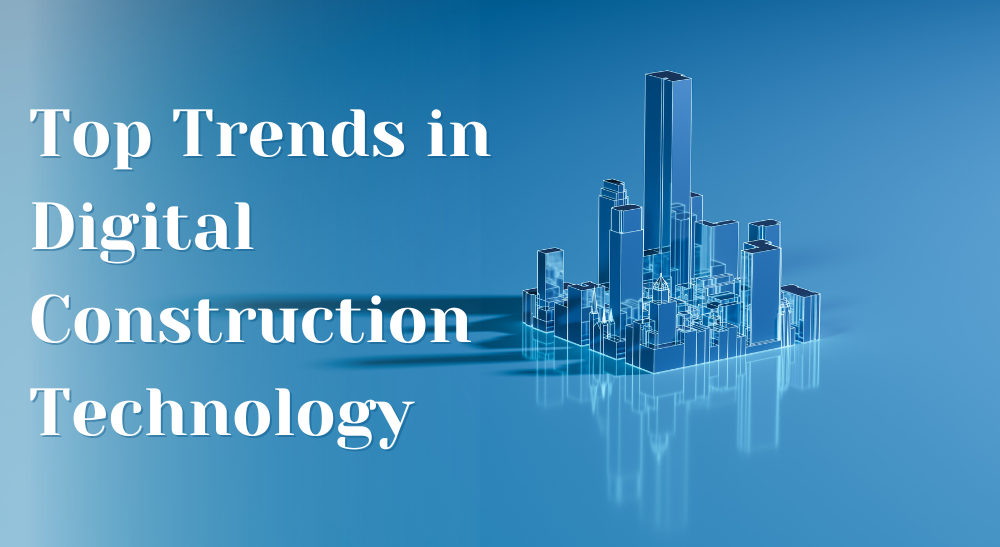Phone: (IN) +91 80035 33335 (USA) +1 720 800 8859 Email: info@bimpactdesigns.com
Top Trends in Digital Construction Technology
Digital construction technology has emerged as a game-changer in the architecture, engineering, and construction (AEC) industry, revolutionizing traditional practices and paving the way for unprecedented efficiency and innovation. From Building Information Modeling to drones and artificial intelligence, several trends are reshaping how construction projects are conceptualized, planned, and executed.

Introduction to Digital Construction Technology
In today’s rapidly evolving technological landscape, digital construction technology encompasses a wide array of tools and methodologies aimed at streamlining construction processes, reducing costs, and enhancing project outcomes. This includes leveraging advanced software solutions, cutting-edge hardware devices, and data-driven insights to optimize every stage of the construction lifecycle.
Building Information Modeling
At the forefront of digital construction technology is BIM, a sophisticated process that involves creating digital representations of physical and functional characteristics of a building. By centralizing project information and enabling collaborative workflows, BIM facilitates better decision-making, reduces errors, and improves project coordination.
Virtual Reality and Augmented Reality
Virtual Reality and Augmented Reality technologies are transforming the way construction projects are visualized and experienced. By immersing stakeholders in virtual environments, VR enables realistic simulations of construction sites, while AR overlays digital information onto the physical world, offering valuable insights during design reviews and on-site inspections.
Drones in Construction
Drones have become indispensable tools in the construction industry, providing aerial perspectives that aid in site surveying, progress monitoring, and safety inspections. Equipped with high-resolution cameras and advanced sensors, drones offer unparalleled visibility and data capture capabilities, enhancing project oversight and decision-making.
Robotics and Automation
The integration of robotics and automation is revolutionizing construction tasks traditionally performed by human labor. From bricklaying robots to autonomous vehicles, these technologies are accelerating project timelines, improving safety, and reducing reliance on manual labor, thereby addressing workforce shortages and productivity challenges.
3D Printing in Construction
3D printing technology is pushing the boundaries of what’s possible in construction, allowing for the rapid prototyping and fabrication of complex structures and components. From affordable housing to intricate architectural features, 3D printing offers unprecedented design freedom and cost efficiencies, while minimizing material waste and environmental impact.
Internet of Things
The Internet of Things is reshaping construction sites by connecting physical objects and equipment to the internet, enabling real-time monitoring, control, and optimization of various processes. IoT devices such as sensors, wearables, and smart tools gather valuable data that can be leveraged to enhance safety, productivity, and resource utilization.
Artificial Intelligence in Construction
Artificial Intelligence is playing a pivotal role in optimizing construction operations and decision-making processes. Through advanced algorithms and machine learning techniques, AI systems can analyze vast amounts of data, predict project outcomes, and identify potential risks, empowering stakeholders to make informed choices and mitigate uncertainties.
Sustainability in Digital Construction
Digital construction technologies are driving sustainability initiatives within the industry, promoting eco-friendly practices and resource-efficient designs. From the use of renewable materials to energy-efficient building systems, these innovations are helping to reduce carbon footprints and promote environmentally responsible construction practices.
Challenges and Opportunities
Despite the transformative potential of digital construction technology, several challenges remain, including issues related to data security, interoperability, and workforce readiness. However, with the right investment in training and infrastructure, these challenges can be overcome, unlocking immense opportunities for growth and innovation in the construction sector.
Regulatory Considerations
As digital construction technology continues to evolve, regulatory frameworks must adapt to ensure compliance with industry standards and safety requirements. From building codes to data privacy laws, regulatory considerations play a crucial role in shaping the adoption and implementation of digital solutions within the construction industry.
Market Trends and Forecast
The digital construction technology market is poised for significant growth in the coming years, fueled by increasing demand for efficiency, sustainability, and cost savings within the construction industry. Emerging trends such as modular construction, prefabrication, and smart buildings are expected to drive innovation and reshape the future of construction.
Conclusion
In conclusion, the top trends in digital construction technology are revolutionizing the way construction projects are planned, executed, and delivered. From BIM and drones to AI and sustainability initiatives, these innovations are driving unprecedented levels of efficiency, safety, and sustainability across the construction industry. By embracing digital transformation and investing in the right tools and technologies, stakeholders can position themselves for success in an increasingly competitive and dynamic market.
